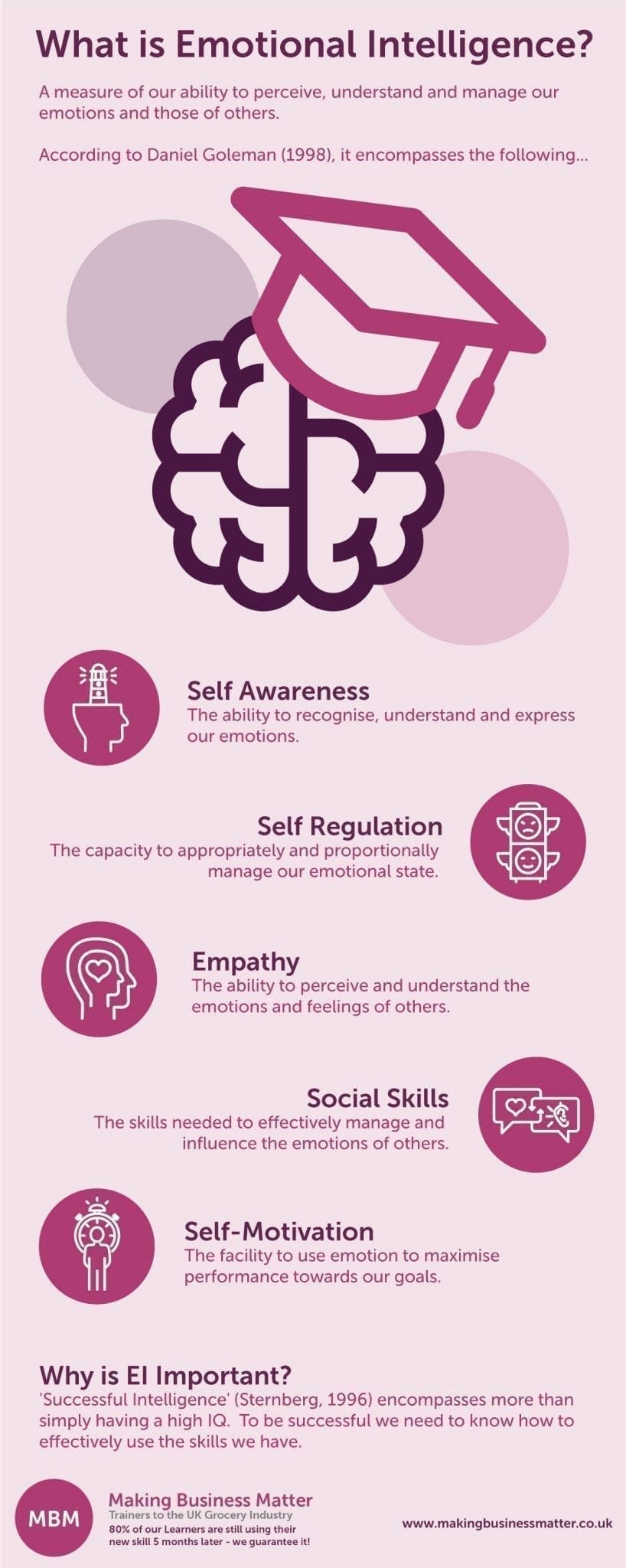What is Emotional Intelligence?
Emotional Intelligence is a concept we hear a lot about. Currently, it is very much an on-trend business buzzword. We’ve all heard it bounded around the office; ‘she’s got great emotional intelligence’, or ‘he really could do with acting with more emotional intelligence’. But, what do we mean by it? Is it intelligence? And, most importantly, why is it useful in business terms? Read on to find out more.
Early Beginnings – The Ability Model
Emotional Intelligence or EI has been around for at least the past half-century. In fact, the underlying concept can be traced back thousands of years to the Korean term, ‘nunchi’. The subtle ability to gauge and comprehend the moods and thoughts of others’. However, it wasn’t until the work of Psychologists Peter Salovey and John D Mayer in the early 1990s that it started to develop as a measure of intelligence.
Salovey and Mayer’s research defined EI as a measure of a person’s abilities to perceive, understand, and manage their emotions and those of others. Their approach became known as the ‘ability model’. It looked to classify it as new intelligence, much like IQ.
They Found Emotional Intelligence to Include how we do the Following:
- Understand and express emotions
- Perceive and understand the emotions of others
- Regulate our own emotion
- Use emotion to maximise performance
In other words, it covers how good we are at being aware of our own emotions, how we understand the emotions of others, and how we use that for a positive benefit.
Why is it Important?
In recent years there has been a move towards the idea that being intelligent isn’t just about having a high IQ. Performance Consultant Graham Jones tested this by interviewing successful athletes and military and business leaders. He found that their success came not just by having strong skills, but from knowing how to put them to the best use. Simply put, those that are successful require more than academic intelligence.
Sticky Learning ® is 7 times more effective than 1-day training courses. Plus, you will get a Chain of Evidence proving your Return on Investment. Discover soft skills training that changes behaviours long term.

Can We Teach It?
This is where things get interesting! The original, academic authors differ in their views. John D Mayer states that EI is shaped by genetics and early life experience. Peter Salovey, on the other hand, feels people can make some improvements to their EI.
Development of the Concept – What is The Mixed Model Model of Emotional Intelligence?
In 1995, Journalist Daniel Goleman’s publication of his mixed model opened up the concept from its scientific beginnings. He argued that emotional skills can be learned and developed over time. This, although criticised by some academics, has led to its growth as a management training tool to help evaluate, understand, and develop individual EI.
The Commercial Wing
Following Daniel Goleman’s research, EI is now widely recognised as an essential trait for modern business leaders. It certainly links in with the current leadership trend towards great leaders demonstrating ‘transformational leadership’ qualities. This is because transformational leaders tend to have strong social skills. They also demonstrate many of the key aspects of EI as noted above.
Final Thoughts
As a classification of intelligence, EI is very much in its infancy. Whether emotional intelligence is a true form of intelligence is an argument that will take many years of research to resolve, and whether it can be taught or developed may take even more.
What is clear, is that the concept has taken on new a new life as a management tool. Consequently, It might just be the case that the commercial gains of enhancing skills which lead to better self-management and positively influence relationships with others will go far beyond whether it is categorised as intelligence or not- see our work on Influencing Skills. After all, considering our emotions and those of others can never be a bad thing!
Here at MBM, we have developed a helpful infographic which distils and combines some of the key concepts of both the ability and mixed models, presenting them in an easy to understand way:

Did this article resonate with you? What are your experiences of emotional intelligence? Have you looked to develop yours? Have you noticed positive benefits personally, or to your team? Let us know about it by posting a comment below.




